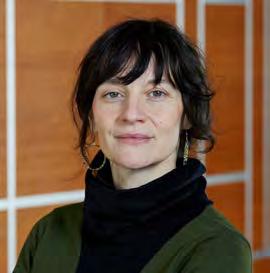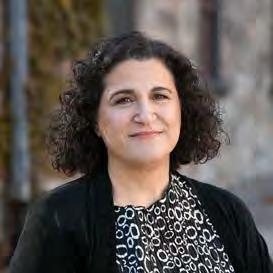
4 minute read
Catalyst Grant
Institute for Pain Research & Care / McMaster Institute for Research on Aging Catalyst Grants
- Dr. Aimee Nelson
Corticomuscular Coherence Brain-Computer Interface to Treat Chronic Neck Pain
Primary Investigator: Aimee Nelson, PhD Start Date: 2022
Brief Overview and Progress to Date
This project investigates the use of a novel biological signal as measured by the coherence between the cortex and the muscles of the neck. The research involves training individuals with chronic neck pain to increase their coherence measure through repeated practice. Practice requires individuals to make head turning movements rightward, leftward, upward and downward and maintain their fixation on the target for a period of time. Two groups of patients are planned. One group will receive coherence measures as feedback; and the other does not receive this feedback. Practice will occur three to five days per week, for four weeks. The hypothesis is that the coherence group will demonstrate increased coherence over repeated practice. The second hypothesis is that increased coherence will be associated with pain relief as measured by pain questionnaires.
Institute for Pain Research & Care / McMaster Institute for Research on Aging Catalyst Grants
Persistent Post-Surgical Pain, Postoperative Cognitive Dysfunction, and Resilience in Older People Undergoing Elective Knee Surgery: A Mixed Method Project to Explore Associations and Underlying Mechanisms
Primary Investigator: Maura Marcucci, MD, MSc Start Date: 2021
Brief Overview and Progress to Date
ArthroCaP is a proof-of-concept study to explore the interplay between chronic postoperative pain, self-reported recovery (i.e. satisfaction), coping abilities/expectations about surgery, and postoperative cognitive trajectories in >=50 years patients undergoing elective total knee arthroplasty. According to a prospective cohort design, the study includes a longitudinal assessment of pain, pain therapies, a more comprehensive measure of satisfaction after surgery and cognitive performance. It also includes the evaluation of possible biomarkers of pain-related cognitive dysfunction. “IPRC funding has allowed the design and launch of the project, supporting the costs so far associated with research personnel and biomarkers measurement. Becoming part of the IPRC community has also offered opportunities of dissemination, like presenting at the IPRC Symposium and submission of the study rationale and protocol to the Canadian Journal of Pain.”
- Dr. Maura Marcucci
Institute for Pain Research & Care / McMaster Institute for Research on Aging Catalyst Grants
- Dr. Pasqualina Santaguida

A Feasibility Study to Assess the Added Value of Integrated Musculoskeletal BiofFeedback Device (IMBED) Combined with Neuromuscular Exercise and Education (GLA-Dtm) to Decrease Chronic Pain in Older Adults with Osteoarthritis
Primary Investigator: Pasqualina Santaguida, PhD, PT,
Stuart Phillips, PhD, MSc, BSc and Qiyin Fang, BSc, MSc, PhD, LEL Start Year: 2020
Brief Overview and Progress to Date
The project is partitioned into two phases. The first phase focuses on developing a technology to measure attributes of movement (position, acceleration, EMG activation) and a pain mapping app to be synchronized with the other data collection. We are on our second prototype in which we attached EMG sensors rather than the commercial unit from the first iteration. We have also developed software to display the signal in real-time and save these data files for later review. We are currently working on calibration and accuracy testing. This will be followed by user testing including clinicians and people with osteoarthritis in the Smart home laboratory. We expect this to be completed by November/December.
The second phase is the implementation of the GLAD osteoarthritis exercise program. We will run through the sixweek program at PACE starting in mid-October. We will then start training in two groups (with and without the IMBED device). Additional feedback and user testing follow.
Institute for Pain Research & Care / McMaster Institute for Research on Aging Catalyst Grants
A User-Centered Approach to Develop a Pre-Surgical Rehabilitation Program for Patients with Lumbar Spinal Stenosis
Primary Investigator: Luciana Macedo, PhD Co-Investigator: Lisa Carlesso, PhD Start Date: 2019
Brief Overview and Progress to Date
The two primary aims of this project were to (1) investigate expectations, satisfaction and lived experiences of surgical patients with lumbar spine (LSS) surgery using a qualitative approach; and (2) Identify modifiable predictors of postsurgical outcomes in patients with LSS.
Data collection has been completed for Aim One of this project. We have conducted 40 interviews (18 pre-op and 22 post op). We have completed coding all interviews and grouped results into themes. Given the richness of data provided to date, we expected a report and at least four manuscripts arising from the interviews (two to be completed by the fall). Concerning Aim Two, we are on the last steps of data analysis. We have completed traditional statistical analysis and are now in the process of preparing for the least square means analysis (as one of our investigators responsible for this was unavailable due to the pandemic). We have published the study protocol and are preparing a manuscript for publication. “As an early career research this grant was crucial to kick start my research program. As part of this grant, I was able to develop new collaborations within and beyond the university. This includes collaborations with spine surgeons, health care administrators, community organization such as the YMCA, physiotherapists, psychologists and beyond.”
- Dr. Luciana Macedo











